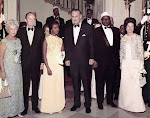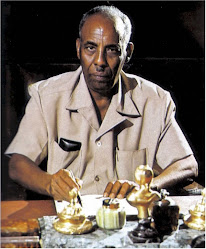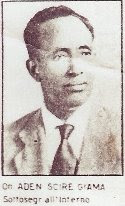The recent Memorandum of Understanding delegitimizes the federal government and pre-empts its sovereign leadership role in the internal and external affairs of Somalia
Dr-Mohamud M Uluso, a Somalia analyst

In implementing their recently concluded regional security cooperation agreement and reaffirming their indefinite military occupation of Somalia, Ethiopia and Kenya have decided to takeover and perhaps later annex Somalia under the cover of the Inter-Governmental Authority on Development (IGAD). Since only Ethiopia exercises uncontested power within the Organization, on 6 December 2012, IGAD Joint Committee of Ethiopia and Kenya under the auspices of former Kenyan Minister, Mr. Kipruto Arap Kirwa, IGAD Facilitator for Somalia Peace and Reconciliation (IFSPR), issued a statement and Memorandum of Understanding (MoU) on Grand Stabilization plan (GSP) for South and Central Somalia.
MARGINALIZING STRUCTURES
As explained in the prerelease statement, the GSP covers political reconciliation, local administration, national security, rule of law, and delivery of necessary assistance to communities in need. In addition to Ethiopia and Kenya, a Somali team liaised with the Office of the Prime Minister and the Ministry of Foreign Affairs of Somalia and led by former head of the Somali National Security Services (SNSS), General Mohamed Sheikh Hassan attended the IGAD Joint Committee deliberations in Addis Ababa. It is not clear if the new federal government had full knowledge of the team's existence, working responsibilities and accountability.
The Office of IFSPR is independent from IGAD's Secretariat. The IGAD Facilitator is based in Addis Ababa, while the IGAD Secretariat is based in Djibouti. For further background information, on 28 April 2010, a Memorandum of Understanding on Somalia has been signed among AMISOM, UNPOS, and IGAD Facilitator. This tripartite MoU marginalizes IGAD Executive Secretary, Inj. Mahboub Maalim who is of a Somali-Kenyan origin from Somalia peace process.
The new IGAD Joint Committee initiative takes place while the international community- the donor countries, the United Nations, the Arab league, the Organization of Islamic Countries and the African Union are reviewing their strategic cooperation with the newly elected post transitional federal government in the light of the decisions reached during the Mini Summit held in New York in September 2012. Furthermore, it comes out after the first official visit of the president of the federal government, Dr. Hassan Sheikh Mohamud to Ethiopia and Djibouti and in the midst of his official visit to Turkey with which the federal government has signed important economic and security agreements.
CHALLENGES AHEAD
Fortunately with unblinking honesty, the Deputy Special Representative of the Secretary General (DSRSG), Peter de Clercq published a brief titled 'What next for the United Nations in Somalia?' in the Tumblr blog of the United Nations Political Office for Somalia (UNPOS) in which he highlighted the ongoing strategic review process dictated by the new political dispensation. While reading the brief is more informative, the DSRGS made the following critical points:
• That the federal Government has sought UN and AU support for rebuilding the security apparatus (national army and police force), rebuilding a credible judiciary system, implementing a decentralization and local/regional administrations as well as undertaking a comprehensive capacity building of Somali Institutions;
• That the UN has committed to align itself along the 'six pillars' plan announced by the President of Somalia and the new UN mission will concentrate on state and peace building. He quoted President Hassan Mohamud saying to the UN Review Mission: 'If you don't start treating us as a viable State, we will never become one.'
• Finally that the ambitions of the new administration match the challenges ahead and that the administration has asked a space to think through and implement the new strategy laid out by the president in his 'six pillars' strategy.
It is absolutely buoyant to see that an official of UNPOS is capable to voice such a rightful and honest statement in opportune time so that the end of transition would not be a farce. The DSRSG argued forcefully that 'peace building is a complex business, but not giving this important [Somali] initiative a chance brings even bigger risks.' Time will tell if his views are embraced wholeheartedly and implemented without delay by his leaders.
Rather than reinforcing the message of his deputy and five days before the signing of the MoU in Nairobi, Kenya planned for 13 December 2012, the SRGS, Dr. Augustine Mahiga, issued a statement in which he welcomed the IGAD Facilitator Initiative for Somalia. The assertion that the new initiative is a Somali-owned, led process is far from the truth.
The content of MoU raises many questions and concerns. It consists of a preamble and 9 articles. The preamble stresses the threat of terrorism, threats of State, human insecurities, other emerging security concerns, commitment of government of Somalia to work within IGAD's framework and stabilization, and the 'required partnership engagement' for greater stability in Somalia. Article 5 of the MoU overrides and restricts the constitutional, political and administrative responsibilities, prerogative and citizens' relationship of the Somali Government.
DELEGITIMIZING THE FEDERAL GOVERNMENT
First and foremost, the MoU delegitimizes the federal government and pre-empts its sovereign leadership role in the internal and external affairs of Somalia. It attempts to completely abort the prospect of the international efforts geared towards statebuilding and peacebuilding in Somalia. It is takeover, not support of Somalia. Above all, it ignores the political arrangement created by the adoption of the provisional constitution, the ending of the transitional period and the rehabilitation of Somali State in accordance with the political platform announced by the new Government.
Other glaring shortcomings of the MoU include the exclusion of Eritrea, Sudan, Uganda, Djibouti and Burundi, and the empowerment of IGAD Facilitator over UN/AU Facilitators. The MoU creates multiple overlaps and weakens the centrally guided and coordinated implementation of the approved Somali National Security and Stabilization Plan (NSSP), which outlines in detail the establishment of complex structures at national, regional and district levels and the legislations required to create a secure and safer Somalia. These tasks fall under the jurisdiction of the President, Federal Parliament and the Council of Ministers.
During his first visit to Kenya in November 2012, Prime Minister Hailemariam Desalegn of Ethiopia stated that his country views Kenya as a strategic all-weather partner and friend in a troubled region. He also defended Kenya's direct control of the process for setting up administrations in Jubba and Gedo regions in violation of Somali sovereignty, provisional constitution and UN resolutions.
It is interesting to see if the international community and the United Nations are willing to go along with the Ethiopian and Kenyan takeover of Somalia in violation of the latter's independent self-governance and political transformation. The Ethiopian bid to secure its regional power role at a time of state failure, civil conflicts and undemocratic regimes in power could be potentially a destabilizing factor rather than a stabilizing power in the region.
As a matter of urgency, the federal government has to streamline its strategic dealing with the international community, develop and practice protocols and procedures for uprooting its internal dysfunctional behavior and creating disciplined working habit that will strengthen its decision making and execution process. The basis of this reform must be the development of a national political platform that will boost national loyalty to a clear domestic and foreign policy agenda. In a nutshell, to diminish the unwarranted external influences and interferences, the federal government must act quickly by mobilizing the public awareness on citizenship, sense of patriotism, justice, social harmony and common interests.




.jpg)











No comments:
Post a Comment